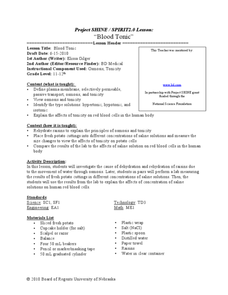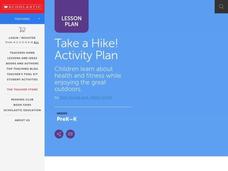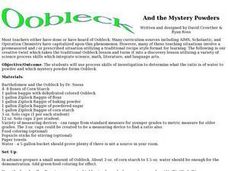Baylor College
Water in Your Body
Do you know how much water you have had in the last 24 hours? Do you know how much your body needs? In this hands-on activity, your class members will estimate how much water our bodies lose each day by filling and emptying one-liter...
Alabama Learning Exchange
Light, Dry and Nutritious - A Look at Dehydrated Food
Fifth graders study dehydration and dehydration of foods. They measure the amount of water lost from fruits as they are dehydrated. They use desktop publishing software to design an advertisement for dehydrated fruit after researching...
Curated OER
Solar Energy - Dehydration
Sixth graders explore process of drying food using solar energy. They cook and/or dry food such as pumpkins, watermelon, corn, and deer meat, explain how solar energy changes foods, and compare and contrast solar energy with other forms...
Curated OER
Water/Hydration
Students develop an understanding of the role water has in the body and the importance of getting enough water each day. Through the instructional activity, students recognize the risks and signs of dehydration. Also, they identify...
Curated OER
Lipids: Fats and Oils
A fantastic presentation with great images should improve student understanding of lipids and their involvement in the body. The chemistry of different fats, phospholipids, and steroids are explained. Additionally, the specific...
Curated OER
People and Space
Learners eat dehydrated foods that the astronauts would eat in space. In this dehydrated foods lesson plan, students make lists of food they could eat, discuss how dehydration takes place, eat food, and complete discussion questions.
Desert Discoveries
Desert Tortoise: Fact or Fiction?
Here is a good game that will determine which team knows the most about the Sonoran Desert tortoise. There are 16 questions posed, and the answers are printed in bold for the benefit of the teacher. Question # 16 reads, "Desert tortoise...
Curated OER
Lipids: Fats and Oils
A fantastic presentation with great images should improve student understanding of lipids and their involvement in the body. The chemistry of different fats, phospholipids, and steroids are explained. Additionally, the specific...
Science Friday
Sublime Sublimation
Dry ice isn't dehydrated water, and young scientists learn why in this fascinating presentation. After watching a video, they complete three different activities using dry ice. Upon completion, they discuss the scientific...
Curated OER
Microbes and Health
Students participate in activities that show them how tiny germs are spread. In this germs lesson plan, students engage in hands on lessons to show them how microorganisms can easily spread disease through the mouth and hands.
Curated OER
Island Survival
Students participate in a simulation of life on a deserted island. They apply their critical thinking skills and knowledge of oceans and islands to "survive" and ultimately return to safety. Lesson contains adaptations for all levels.
Curated OER
Autumn Arrays
Autumn is a time for nature to get ready for the upcoming winter. After listening to the book Time to Sleep about the changes of deciduous trees in the fall, learners monitor a tree on a daily basis and view photos of fall...
Curated OER
Blood Tonic
Young scholars investigate the process of osmosis using fresh potato cuttings in saline solution. In this biology lesson, students explain the difference between hypertonic, hypotonic, and isotonic solutions. They collect data...
Curated OER
Hand Washing: I can handle it!
Students wash cinnamon off of their hands in a variety of ways to learn proper ways to disinfect. In this washing hands lesson plan, students use water, soap, cooking spray, and other ingredients to wash hands and talk about the results.
Curated OER
Take a Hike!
Students explore the benefits of staying active by going on a hike. In this physical education lesson, students discuss the concept of a hike, where a good place to hike is and what types of foods are necessary to stay nourished....
Curated OER
The Last Great Canal
Students read about a cholera outbreak in the 1840's. They read maps, predict how cholera moved throughout the country and participate in a lab activity that demonstrates how disease is spread. They compare cholera through time.
Curated OER
Worksheet 8. Vocabulary Review
For this vocabulary review worksheet, students complete the 9 sentences on the page using the 9 words in the word bank. The words all have to do with food.
Curated OER
Hiking / Trekking
In this online interactive vocabulary skills worksheet, students answer 10 fill in the blank questions regarding hiking and trekking words. Students may submit their answers to be scored.
Curated OER
What's the Matter with My Orange?
Learners use oranges to informally explore decomposition, dehydration, fermentation, the water cycle, bacteria, yeast, food webs, the needs of living things, and physical vs. chemical change over a period of three or more months.
Curated OER
Reading Comprehension 1: Level 12
Need to assess the reading comprehension level of your class or of a new student? The subject matter of the reading passage, euthanasia, is sure to engage your readers’ interest while the questions test a variety of comprehension...
Curated OER
Microbes and Health
Sixth graders become acquainted with the concept of how microorganisms cause disease. They role play that some class members have exhibited some alarming symptoms. Groups must determine which disease the symptoms are pointing to.
Curated OER
Oobleck and the Mystery Powders
Students listen to the book, "Oobleck," by Dr. Suess before experimenting with mystery powders. They determine the proper ratio of powder to liquid to make the Oobleck.
Curated OER
Be good to yourself and have breakfast
Pupils comprehend the origins of the word "breakfast" and its relevance to their lives. They recognize the value of eating a nutritious breakfast everyday. Students comprehend that eating breakfast helps maintain a health body weight.
























